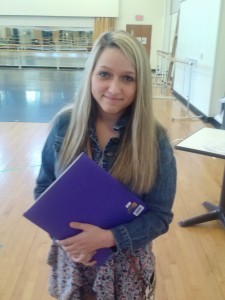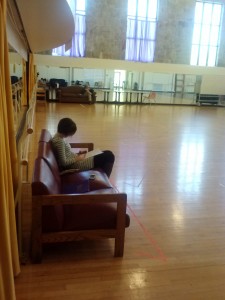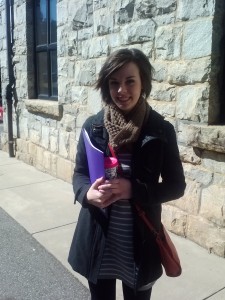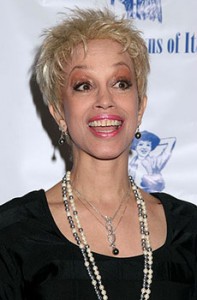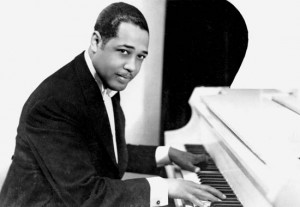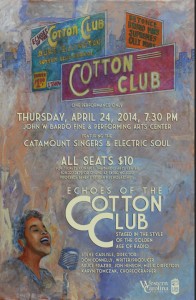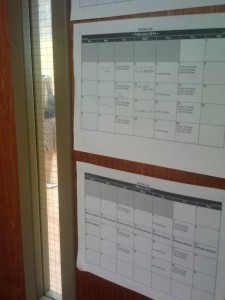
A peek inside room 216 at Breese Gymnasium for the Echoes’ of the Cotton Club auditions.
Photo by Randy Conn.
“Echoes of the Cotton Club” was a live radio broadcast at the John W. Bardo Fine and Performing Arts Center for one night only on April 24, but just as any play it it takes long preparations and practice. And it all starts with the auditions.
The Western Carolina Journalist followed a few of the students and staff auditioning for the show in February. Day one of the audition process was overseen by Communication department head and ‘Echoes’ script writer Don Connelly, School of Music Professor, Dr. Bruce Frasier, and retired Western Carolina University Associate Dean of the Honor’s College and Producer, Steve Carlisle.
On the cold Saturday morning, Feb. 22, the Breese Gymnasium was buzzing. 11 WCU students were prepared to grab their chance for glory. Students were reading a particular part they had in mind but according to their delivery, evaluated by the panel of judges, they were quickly placed into a read for another character more in accordance with their style. It is not the easiest job selecting who gets what part.
“We have so much great talent trying at this thing that we could probably do two complete casts!” Carlisle said. “The hard part is choosing who gets that bow.”
Lizzie Reynolds is a freshman at WCU with a major in musical theater. As she left the tucked away audition room she seemed to be in high spirits.
“I feel comfortable about my audition,” Reynolds said. “It was really relaxing. They gave me great feedback. They gave me even more about the character and they had me read it again and again and it gave me more motivation towards the character.”
Reynolds didn’t seem to be too stressed or walking on eggshells about her audition either.
“It was just really relaxing,” Reynolds shared. “I’ll just be waiting to hear back through email or phone call and if not I’m just gonna keep trying!”
Patrick Hinkle, an older gentleman, sat alone on a couch outside the audition room. He was shuffling through his papers and rehearsing lines in his head when he was asked why he was there. “I’m reading for Ken. He’s a World War II radio announcer,” Hinkle shared.
Unfamiliar with the entire story of Harlem, New York’s original Cotton Club, Hinkle said, however, that he did spend most of his time studying the script for the Cotton Club play. If selected, this wouldn’t be Hinkle’s first casting gig, either.
“Last year was my first time in a radio play. I was in Tarzan of the Apes,” said Hinkle, “so I kinda have an idea about the process. I played a servant of the professor and I also got to play a pirate.”
Hinkle likes the theater because it helps him escape reality.
“I work in IT, so this is a great departure from my normal life,” Hinkle said. This was his third audition with a record of one successful callback and one unsuccessful.
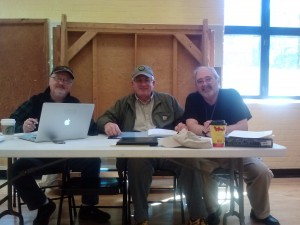
Casting directors Bruce Frasier (left), Don Connelly (center), and producer Steve Carlisle (right) oversee the audition process.
Photo by Randy Conn.
The casting directors are reaching out hoping to involve as many students as possible.
“One of the things we are looking for is students to participate in this production. The more students we have, the better. If this show wants to move on to other things we want to have as many students in that production as possible,” Carlisle explained.
Molly Morgan was on her way inside and invited the Western Carolina Journalist into her audition process. Morgan, with determination in her eyes, seemed to be prepared for anything.
“I’m always really nervous as soon as I walk in,” Morgan said. “But I usually relax once I get started.”
Morgan began reading for the part of an in-house waitress at the Cotton Club who awakens main character Roscoe from a terrible hangover. As the read did not go extremely well for that particular character Carlisle placed her into another read, this time, as a GPS unit in Roscoe’s car.
It’s Carlisle’s job to find out who is better for which role.
“And what is better?” Carlisle asks. “Can they bring a certain quality to the scene? Can they take direction? Can they suddenly change, in a sense, which can adapt to what it is I’m looking for that quickly? That’s what we’re looking for and I think you were able to see just that in the audition with Molly [Morgan]. I think you were able to see somebody who gave us what she thought we wanted then took direction and was able to work with it.”
Morgan seemed to really nail the GPS voice.
“I actually used to practice that voice all the time when I was a kid,” Morgan shared. “The first time I did it, I had a Barbie jeep and I always imitated the voice from that. So the first time I did it that’s what I was thinking about but whenever he said just do it with no grammar I thought, OK, let me just get on one tone and you know, just go. I wanted to stop and breath but if I took a breath I knew he was going to think it’s a pause and thought oh no!”
Morgan, feeling good about her audition, exclaimed that she was told she’d hear back from Carlisle later in the week.
Not everyone who could audition could be there that day. Dr. Bruce Frasier explained that some of the finest students already involved in the production as vocalists were not able to audition because they were at the National Association of Teachers of Singing convention in Boston, MA.
There is great importance for the production and audition process, particularly for ‘Echoes.’
“It’s like putting on the academy awards,” Frasier explains. “You only do it one night. But what a night that is. The Super Bowl is only one night too. The Macy’s Thanksgiving Day Parade is only one night. So that’s what we’re doing here. These people that you saw audition, they only do this one time in front of an audience. That puts a hell of a lot of pressure on you that you’ve only got one shot. Everybody in the orchestra, everybody reading in the microphone, all the dancers, all the singers, they’ve gotta bring their “A” game. That’s a heck of a thing to have to learn.”
The “Echoes of the Cotton Club” takes the audience on a journey back to a time when the original Cotton Club was going through a style change with Duke Ellington style of music. Lucky for WCU, “The Duke’s” granddaughter, Mercedes Ellington, joined the show and worked with the production crew to bring a very special element to the radio play.
“Mercedes will provide us with a direct link to something that occurred over 80 years ago,” Connelly explained. “That’s what makes it so incredible. The students here are going to have the opportunity to learn from her experiences and history. This is an internationally known choreographer and dancer that the students are going to get to work with. When you look at her background, she’s the President of the Duke Ellington Center for the Performing Arts in New York and you look at her contacts and all that she brings here to Cullowhee and it’s just phenomenal. It’s absolutely phenomenal.”
“The title of this show is “Echoes of The Cotton Club,” Carlisle adds. “The Cotton Club itself is a point of departure. Duke Ellington was a very influential early musician in that organization and his presence on the radio had a big impact on the dissemination of the kind of music, that ‘hot jazz’ musical style, which was popular then.”
Carlisle became very passionate about the accomplishments of Duke Ellington and The Cotton Club.
“Look what that style has done for us today,” Carlisle illustrated. “Through the years we’ve seen this music be an influence on many artists today including a lot of current artists who are looking back to that era. Artists like Beyonce’, Justin Timberlake, and Bruno Mars. A lot of these artists are emulating some of the musical styles and even some of the look that dates back to the ‘20’s. The suit and tie, which was done on the Grammys this year with a 1930’s dance theme that had everybody in tuxedos. It’s a return to a little bit of that style that’s very present along the way. Look at the influence of Duke Ellington on the entire Rhythm and Blues R&B music scene. Look at Stevie Wonder who composed a song that we are performing in the show called ‘Sir Duke.’”
Echoes of the Cotton Club will be a rewarding nod to a wonderful time for music.
“We’re trying to involve so many colleges and departments to just make this a big wide sweep across campus,” said Carlisle. “We’re not just putting on a show. There are so many components that go into this production. The amount of rehearsal, the amount of people that are truly working on this, it’s incredible. It’s always interesting at the end of the production, too, because we start putting this together a year ahead of time so at the end of the year, [laughs], we look back at how many people put so many hours into this. It works with the English department, it works with the Communication department, it works with the Honors College, and that’s a beautiful thing that people are able to cross these lines and work with each other because there are so many resources that are not available to just one college or one department. This way we are able to pick off the entire tree instead of just one little section. That’s pretty cool.”
Carlisle and his partners are proud of their project because it is one of a kind and not many universities do that kind of cooperation. “I think were probably one of the only universities in the country that are doing something like this and it takes participation by the whole village to make something like this possible. Not one person could do this alone and it takes a huge team to be able to make such a huge production,” Carlisle added.
